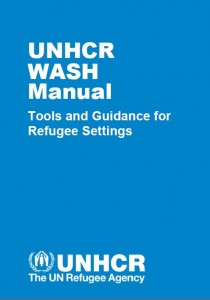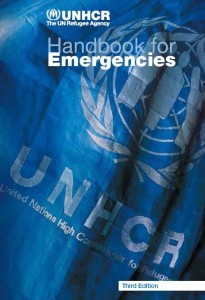
UNHCR field staff and their partners should use this waste register form to keep a record of the types and quantities of waste being disposed at each landfill facility. Ideally waste management short, medium and long term strategies for different waste streams should be re-evaluated and re-organised based on the data collected from this tool.
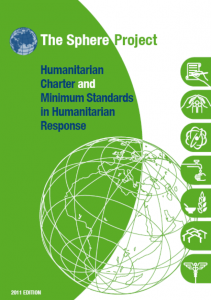
The Sphere Handbook is one of the most widely known and internationally recognized sets of common principles and universal minimum standards for the delivery of quality humanitarian response.
Tags: Bathing Facilities, Capacity Building, Communal Toilets, Cross Cutting, Disability, Disease Vector Control, Drainage, Environment, Excreta Management, Gender, Gender Based Violence, Grey Water Disposal, Handwashing with Soap, Household Water Treatment, Human Right to Water / Sanitation, Hygiene Promotion, Laundering Facilities, Menstruation Hygiene Management, Piped Water Networks, Protection, Public Health, Solid Waste Management, WASH Assessments, WASH Coordination, WASH Monitoring, WASH Programme Management, Water Quality Testing and Surveillance, Water Safety Plans, and Water Supply. Languages: English. Organisations: SPHERE. Categories: WASH Reference Documents.
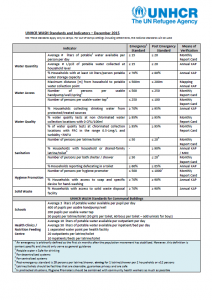
A summary of UNHCR water, excreta management, solid waste management, disease vector control and hygiene promotion standards and indicators for emergency and post emergency refugee settings including means of verification.
Tags: Bathing Facilities, Disease Vector Control, Drainage, Excreta Management, Handwashing with Soap, Hygiene Promotion, Solid Waste Management, WASH Assessments, WASH Monitoring, WASH Strategy Development, Water Quality Testing and Surveillance, and Water Supply. Languages: English. Organisations: UNHCR. Categories: WASH Indicators and Standards.
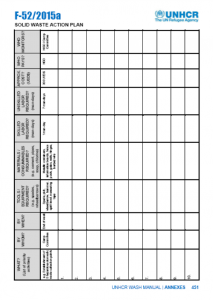
Where required, UNHCR and WASH actors may use this template to develop a solid waste management action plan that describes a list of prioritised solid waste management activities in addition to WHO, WHAT, WHERE, WHEN and HOW they will be carried out.
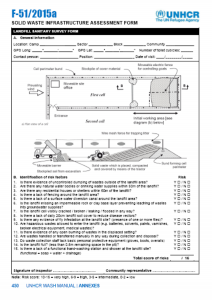
This form can be used to assess the refugee landfill site for public health and environmental sanitary risk factors.
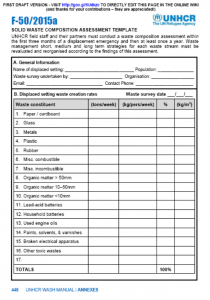
UNHCR field staff and their partners should conduct a waste composition assessment to assess the types of waste being produced and their and rates of production. Ideally the assessment should be carried out within the first three months of a displacement emergency and then at least once a year. Waste management short, medium and long term strategies for each waste stream should be revaluated and reorganised according to the findings of this assessment.
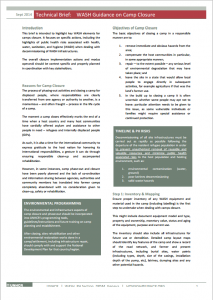
This brief is intended to highlight key WASH elements for camps closure. It focuses on specific actions, including the highlights of public health risks associated with health, water, sanitation, and hygiene (WASH) when dealing with decommissioning of WASH infrastructures. The overall closure implementation actions and modus operandi should be context specific and properly planned in coordination with key stakeholders.
Tags: Camp Closure, Cross Cutting, Environment, Excreta Management, Solid Waste Management, WASH Coordination, WASH Programme Health and Safety, WASH Programme Management, WASH Strategy Development, and Water Supply. Languages: English. Organisations: UNHCR. Categories: WASH Guidelines, WASH Operational Guidelines, WASH Policy Guidelines, and WASH Reference Documents.

These WASH related primer questions have been designed to assist UNHCR and WASH actors collect data from key informants and focus groups during WASH assessments. The list of questions is not exhaustive and is merely intended as a conversation primer (aide memoire).
Tags: Excreta Management, Human Right to Water / Sanitation, Hygiene Promotion, Protection, Public Health, Solid Waste Management, WASH Assessments, WASH Monitoring, WASH Strategy Development, and Water Supply. Languages: English. Organisations: UNHCR. Categories: WASH Blank Forms, WASH Emergency Guidelines, WASH Emergency Tools, and WASH Reference Documents.
 English
English









